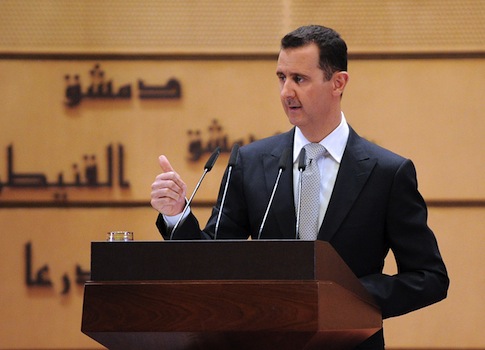The Syrian regime of Bashar al-Assad is systematically targeting civilians and hospitals, often with chemical weapons, to reverse recent setbacks in the country’s civil war, witnesses told the House Foreign Affairs Committee on Wednesday.
Assad’s forces have suffered a number of battlefield defeats in recent months, with the Islamic State and the al Qaeda affiliate Jabhat al-Nusra gaining ground north of the capital Damascus and more moderate rebel groups achieving victories in the south. The Syrian army has also lost about half of its soldiers throughout the course of the four-year civil war and has increasingly relied on outside militant groups such as Hezbollah.
Amid the defeats for the Assad regime, reports have surfaced of dozens of chemical weapons attacks from barrel bombs filled with toxic chlorine gas. Western officials accuse Assad’s forces of dropping the chlorine bombs from helicopters, noting that his regime is the only side in the conflict that has been known to use such aircraft.
Robert Ford, a former U.S. ambassador to Syria in the Obama administration, said at the committee hearing that Assad has used chlorine weapons to displace civilians from opposition areas while his forces suffer from attrition.
"As that dynamic goes forward, the Syrian regime will more and more want to use chemical weapons to make up for manpower shortages," he said. "They are not deterred from using them."
Although Syria agreed to relinquish its chemical weapons stockpile as part of a deal brokered by the United States and Russia in 2013, chlorine was not included as a part of that deal. Chlorine also has several civilian uses for water purification and other sanitation projects. However, manipulating any chemical as a weapon violates the Chemical Weapons Convention (CWC) that Syria joined in 2013.
Ford said "an international consensus forged after World War I"—when chlorine was first used as a chemical weapon—is "steadily eroding" due to the international community’s failure to prevent Assad’s chemical attacks.
Dr. Mohamed Tennari, a coordinator for the Syrian-American Medical Society in the northern Syrian province of Idlib, related his experience on March 16 when chlorine bombs were dropped near his hometown of Sarmin in Idlib.
Tennari heard helicopters from his home that night and received an alert that chemical weapons had been launched in the area. On the way to his field hospital, Tennari smelled a bleach-like odor in the air. Dozens of victims had already flooded his hospital when he arrived; several complained of a burning sensation on their eyes and throats and had difficulty breathing. Chlorine gas causes the victims’ lungs to fill with fluid, which can then lead to suffocation.
Among the victims were his friend Waref Taleb and Taleb’s mother, wife, and three young children. All of them perished. The committee was shown a video of the dying children, including one who foamed at the mouth.
"Everything that we did for them was not enough to save their lives," said Tennari, who also testified at the United Nations Security Council earlier this year.
Tennari added that "this is a regular event that goes on." His organization has documented 31 chlorine attacks in Idlib since the March 16 incident. More than 580 Syrians were victims of the chlorine bombs, and 10 died from suffocation.
Assad has also targeted medical workers and their facilities, Tennari said. His field hospital has been struck by the Syrian air force 17 times despite staying neutral in the war. According to the group Physicians for Human Rights, more than 624 health workers have been killed in the fighting.
All of the witnesses at the hearing expressed support for a no-fly zone in Syria that could protect civilians from the chlorine bombs and attempt to reach a negotiated settlement to the war. The Obama administration has yet to support such a step.
Secretary of State John Kerry said Tuesday that "everyone’s patience is wearing thin" regarding Assad’s suspected use of chlorine weapons. He said he pressed Russia, Syria’s staunch ally and military patron, to raise the issue with Assad.
However, Russia is likely to use its veto on the U.N. Security Council to block any punitive measures against Assad such as a no-fly zone. The international body has still not assigned blame for the chemical attacks in Syria.
Tennari said he hoped the United States and other Western nations would not further delay efforts to prevent the use of chemical weapons in a war that has claimed more than 200,000 lives.
"Our main ask is for the international community to help protect us from these attacks," he said. "If that means a no-fly zone, so be it."
